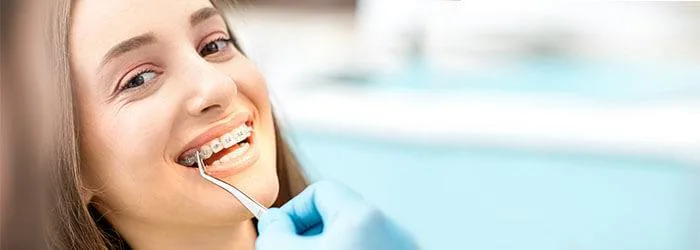You should be prepared for the fact that taking care of your teeth will be more difficult once you get braces. Braces have countless tiny spaces to trap food, and this trapped food causes plaque, which can lead to many other dental problems. Because of this, it's very important to brush your teeth after every meal (snacks count, too), to rinse with mouthwash, and to floss at least once a day. This may seem tedious or excessive, but neglecting your oral hygiene can lead to serious oral health problems, force you to spend additional time in braces, or cause unsightly staining on your teeth. The extra responsibility needed to care for braces properly is something that both you and your child should be prepared for.
Braces Do More Than Improve Your Smile
They also play an active role in correcting overcrowded and misaligned teeth. This is important because an abnormal bite (also known as “malocclusion”) may cause other problems, such as impaired plaque removal around misaligned teeth, which can lead to gum inflammation and cavities.
Taking good care of braces can help prevent damage to the braces themselves and the teeth underneath as well as make the braces more comfortable to wear. Learning the basics of orthodontic care will help you follow your dental professional's recommendations to keep your teeth and gums healthy during the time you’re wearing braces.
The Basics: Brushing And Flossing
Careful cleaning is required with braces, because plaque bacteria are easily trapped inside and around them. The following procedure will make daily brushing and flossing both simple and effective.
Prepare to brush. Take off elastics and any other removable parts of your orthodontic appliance.
Clean your braces. Hold your brush at a 45-degree angle to clean around the wires and pins of your braces. Brush from the top of each wire down to the bottom. Take your time to ensure that all plaque and debris are removed, and that you work all the way around upper and lower teeth.
Brush your teeth. Clean each tooth individually. First, place your brush at a 45-degree angle the gum line, then apply gentle pressure as you move in a circular motion. Do this for about 10 seconds. Use the same brushing action on all outer and inner tooth surfaces, tilting the brush as needed to better reach the insides of smaller front teeth.
Floss once a day. Have your dental professional show you the best way to floss, or follow the instructions on the product package. You may also want to use a flossing product designed for braces and orthodontic work, like a floss threader.
Rinse and check your teeth. Rinse thoroughly with water or mouth rinse, and examine your teeth and braces in the mirror.
Professional Care: Dentist And Orthodontist Visits
Visit the Orthodontist Regularly
During the time that you have braces on your teeth, you will need to visit the orthodontist regularly for adjustments to your appliance. After a routine orthodontic adjustment, you may experience some tightness or even a slight amount of pain. If this discomfort or pain does not quickly dissipate, or becomes extreme, you should consult your orthodontist. Concerns about your appliances, and any problems with broken parts, should also be brought to your orthodontist's attention immediately.
It’s also important that you continue with regular visits to your general dentist while undergoing orthodontic treatment. Routine checkups are necessary to spot cavities and signs of gum disease. Your dentist or hygienist may also perform frequent fluoride treatments to provide additional protection to tooth surfaces from decay while you’re wearing braces.
Your home oral care techniques will be monitored by your dental professional and changes will be recommended as necessary. As always, be sure to follow their instructions.
Oral Care Products for Braces
We know that caring for your teeth can be a challenge when you have braces. Unfortunately, this means that focusing on oral hygiene and understanding the dental issues you should watch out for is more important than ever before. It's also more important to choose products that'll help you do the best job of caring for your teeth – things like Oral-B electric toothbrush heads made specially for braces, Oral-B threader floss that can maneuver around your wires, and Crest toothpastes that kill germs in spaces between your brackets. They can't do all the work for you, but they can certainly help.
Taking good care of your braces is essential for avoiding complications while they're on and ending up with great-looking teeth once they're off. No matter how much money, pain, and time you've already invested in your braces, proper oral care is still the key to walking away with a beautiful, healthy smile.




